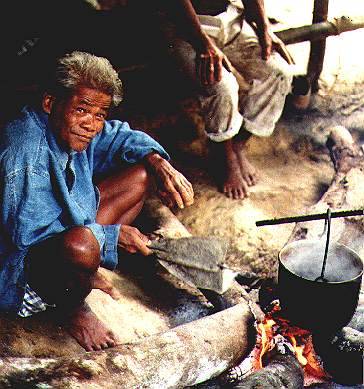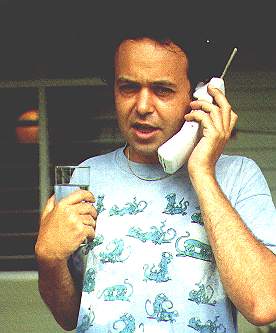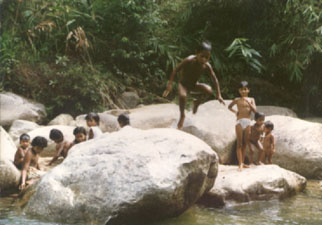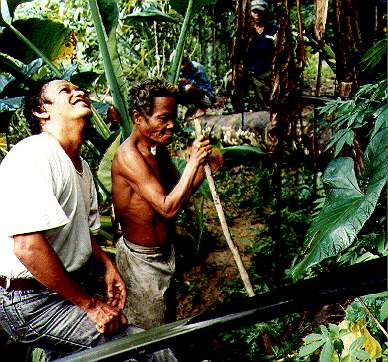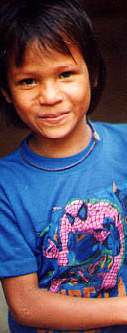guardians of the forest
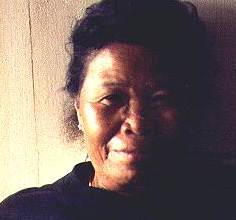
Minah Angong, diva of the rainforest
In rapidly
industrializing Malaysia, the indigenous rainforest tribes
find
themselves desperately struggling for cultural survival.
Mak Minah,
a ceremonial singer from the peninsular Temuan
tribe,
shoots
to pop stardom of sorts soon after meeting a bunch of musicians
from
the big city. Her group, Akar
Umbi, makes waves performing
at the
largest stadium in the country and are featured at the
Rainforest
World Music Festival in Sarawak.
Two days
before Akar Umbi are scheduled to begin recording
their
debut album, Mak
Minah unexpectedly dies.
What begins as an attempt
to document
her mission as cultural ambassador for Malaysia’s indigenous tribes
ends
as a moving indictment of the government’s ethnocidal policy
towards
indigenous cultures.
Beautifully
shot on location in the lush Selangor
River Valley
where
a 400-foot reservoir
dam is being built that will effectively dislocate
the Temuan
from their tribal birthplace and negate their traditional role as
Guardians
of the Forest, this hardworking, no-holds-barred documentary
was written,
produced, and directed by members of Magick
River –
a rainbow
tribe community arts project dedicated to preserving values
beyond
the merely commercial. Guardians of the Forest sheds light on
a brutal
history of colonization going back 500 years and which continues
unabated
even today.
Running time: 52 minutes
Narrated by Rehman Rashid
Written by Kit Leee and Rehman Rashid
Music by Akar Umbi
Additional Music and Effects by
Anton Morgan
Directed by Alan D’Cruz
Produced by Mary Maguire
Executive Producer: Andrew Bird
© 2000 VERADO FILMS LTD
ENQUIRIES: Mary Maguire
U.S.
premier of "Guardians" at Stanford University! ~ Email report from
Mary Maguire!
What inspired you to make a documentary
on the orang asli?
Undoubtedly the late Mak Minah Anggong, a Temuan
asli from Kampong Pertak was the inspiration behind Guardians.
Initially this documentary was to be a tale of her band, Akar Umbi.
Akar Umbi was making amazingly original music - a blend of Mak Minah’s
voice singing the tribe’s traditional songs; an asli bamboo rhythm section;
bamboo flutes played by Antares; and Rafique Rashid’s guitar work
and arrangements.
Through contact with Mak Minah we heard and saw
the plight of the Orang Asli. This led us to research the many anthropological
studies of the Orang Asli - the work of Dentan, Endicott, Baharon Azhar,
Gomes, Jumper and most importantly, Colin Nicholas of the Centre for Orang
Asli Concerns.
We realised that while many academic volumes have
been written about the Orang Asli, very few Malaysians, let alone anyone
else, know anything about them.
This documentary HAD to be made. It was
clear that the Orang Asli were getting a very raw deal.
We felt that the documentary should paint a moving
picture of how the Asli have come to be so marginalised and dominated.
And how this marginalisation is largely due to a difference in perception
of reality and raison d’être between the Asli and modern Malaysia.
We also felt that the Asli story should be part
of the global debate on indigenous people and as documentary makers this
was one way in which it could be done.
Did you face any official resistance in the
making of it? If so, why do you think there was resistance and was
it worth persisting?
There still exists a law, stemming from the Communist
Emergency period, which effectively gives the Department of Orang Asli
Affairs (JHEOA) the right to prohibit non-Asli from visiting an Asli
village - even if the Orang Asli themselves wish that visit.
Realising this we decided to do all our filming
at the Asli villages and their forests before requesting an interview with
the Director-General of the JHEOA.
Our initial requests for an interview were rejected
by the Director-General who said that it was “a sensitive issue.”
It was only after we wrote and spoke to the Secretary-General of the Ministry
of National Unity, who oversees the the JHEOA, that we got the interview.
It was important for us to persist in getting
an interview from the JHEOA because it is the official representative of
the Orang Asli. Balance and offering the right-to-reply is also crucial
to any documentary that wishes to be taken seriously.
To what extent did the orang asli participate
in determining the telling of their tale? Was winning their trust in the
doco important?
Andrew Bird, the executive producer, Mary Maguire,
the producer, and I were part of the Magick River Community, a loose organisation
of people interested in the natural environment and active participation
in the performing arts. It was based in Kuala Kubu Baru in 1992,
and it was then that we first met Mak Minah and the rest of her village.
Antares, the catalyst of the Community, eventually married into the
tribe. We have kept in close contact with them ever since.
This relationship built up a friendship and trust
that was vital to the unique access that we had to the village over the
filming period. We were not a film crew, we were friends with cameras.
How long did the process of making your doco
take? Did you have to overcome financing problems?
From inception to finished film took 2 years and
financing was the main problem. The documentary was budgeted at RM150,000
and no-one was interested in funding or co-producing unknown documentary
makers from Malaysia.
The entire documentary was eventually funded by
what we call our Guardian Angel Investor, Andrew Bird, who set up Verado
Films in the UK, and then gave us complete editorial control over the documentary.
It also took so long because we had to completely
ditch our initial treatment when Mak Minah died two days before the filming
of her main sequences and interview. She was to have been the main
thread of the documentary and Mary and I had to re-think and re-structure
the entire film. We spent weeks combing through every minute of the
rushes to find the film that eventually became Guardians of the Forest.
Why do you think documentaries are seldom seen
and/or made in Malaysia? Is there a shortage of talent, subjects,
interest - or money?
Censorship is by far the main problem.
Social documentaries are successful when
there is conflict and tension to be resolved. In a nation where the
discussion of these elements is deemed to be “sensitive” and therefore
to be avoided, the only documentaries commissioned or broadcast by our
local television stations are outright propaganda, sugar-dusted travelogues
or dated, foreign-produced natural history documentaries.
There is certainly no shortage of Malaysian talent.
Guardians of the Forest was beautifully
shot by Ridzuan Hamdan and an all-Malaysian crew. It was sensitively
edited by Ann Foenander; the ‘magic’ 3-D graphics sequences were done by
Neil Felix and KT Yeoh, the working script polished to a high shine by
Kit Leee and Rehman Rashid; and the beautifully-modulated narration was
by Rehman Rashid. An all-Malaysian team.
But the people who pushed hardest to make an idea
become a documentary were British. Which reminds us that it’s passion
that’s important, not nationality.
Shortage of subject matter? I have a bottom
drawer full of documentary ideas many of which may never see the light
of day because they cannot pass the Malaysian “sensitive” test and
are too local for an international audience. Their ideal place would
be a domestic current affairs or social documentary slot.
Interest? I believe that there is an enormous
hunger for intelligent, investigative, domestic documentary. The
problem is not the audience, it’s the self-censoring broadcasters.
And can they be blamed when TV broadcast licences have to be annually renewed?
Or when most Malaysian productions are directly sponsored and funded by
corporations who fear retribution if they do sponsor a series that may
upset the authorities?
Money is always a problem. Documentary production
is expensive but the return comes from advertising. And advertising
dollars are a function of viewership figures. I believe that domestic
documentaries will command a high audience if they tackle issues that are
of interest to Malaysians and stops insulting their intelligence.
What are documentaries like yours for? Should
docos play an educational role, or are entertainment values just as - if
not more - important?
Guardians of the Forest will undoubtedly
inform and alert a huge proportion of its audience - the asli story is
so little known.
Mak Minah was a friend and one of just over a
hundred thousand Orang Asli who continue to be told that their reality
has no place in Malaysia’s vision for the future.
Being supreme optimists we hope the documentary
will help bring about change.
Kean Wong is the radio correspondent
in Malaysia for BBC World.


